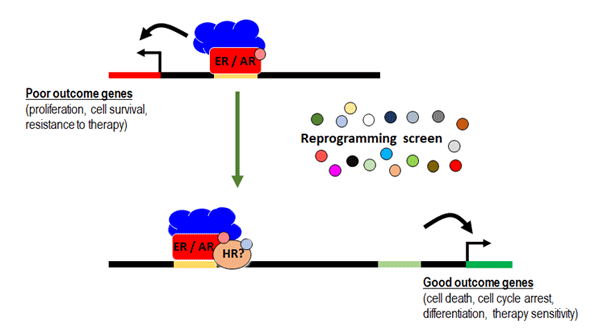South Australian Division Research Programs
Based at the University of Adelaide, the South Australian Health and Medical Research Institute and Flinders University
Predicting urinary incontinence and erectile dysfunction after prostate cancer surgery. PCOR-ANZ Clinical Quality Improvement Research Program. Contact: Dr Michael O’Callaghan
Blood test for aggressive prostate cancer. Contact: Prof Lisa Butler
Evaluation of the impact of obesity on serum PSA in healthy men. Contact: Dr Adel Aref
Targeting lipid metabolism in prostate cancer. Contact: Deanna Miller (PhD student)
Androgen regulated drivers of prostate tumorigenesis. Contact: Josephine Hinneh (PhD student)
Androgen regulation of lipid metabolism. Contact: Julia Scott (PhD student)
The role of Mitofusin-2 (MFN2) in prostate cancer. Contact: Elizabeth Collis (PhD student)
Characterising the dynamic lipid profile changes in prostate cancer recurrence. Contact: Jacob Truong (MSc student)
Targeting microRNA-regulated tumour plasticity to improve prostate cancer outcomes. Contact: A/Prof Luke Selth
Sex hormone binding globulin (SHBG) as a marker of aggressive prostate cancer. Contact: Dr Prabin Gyawali
Centre for Research Excellence in Prostate Cancer Survivorship(CRE-PCS). Contact: Prof Gary Wittert
Understanding why men leave active surveillance for prostate cancer and their supportive care needs while on active surveillance. Contact: Megan McIntosh (PhD student)
Establishing clinical reference values for reactive oxygen species in sperm (ROSS). Contact: Dr Nicole McPherson
Evaluating the interplay between semen ROS concentrations, sperm function and seminal plasma cytokine abundance in men. Contact: Patience Castelton (Honours Student)
Diet for Dads Clinical Trial Contact: Dr Nicole McPherson Study information and participation: D4D study
Healthy Ageing
Relative contribution of novel predictors to the development of type 2 diabetes mellitus (T2DM) in Australian men - updating of GP screening tools. Contact: Dr Sean Martin
Androgens In Men Study (AIMS): a meta-analyses of individual participant data investigating associations of androgens with health outcomes in men. Contact: Professor Gary Wittert
Development of diagnostic global fatty acid reference ranges. Contact: Professor Gary Wittert
Understanding men's misuse of insulin in the pursuit of weight control. Contact: Georgia Goddard (PhD student)
Sleep health
MAILES Sleep Study- Repeat in-home sleep study. Longitudinal follow-up of cardiovascular and cognitive outcomes of obstructive sleep apnoea in middle aged and older men in Adelaide. Contact: Professor Robert Adams
Urinary & Sexual health
Interrogating the effect of depression symptomology on the treatment of lower urinary tract symptoms in men. An observational clinical study. Contact: Dr Sean Martin
Mental health
Helping Australians to better manage stress, adapt to change and improve their mental health with a free, tailored, online, self-help tool. Contact: Dr Kate Gunn (UniSA)
Cardiac and vascular health
Collaborative depression care for coronary heart disease patients: a clinical trial. Contact: Dr Phillip Tully
Blood pressure variability, antihypertensives and dementia risk. An international consortium project. Contact: Dr Phillip Tully
The association between blood pressure variability with cognitive function and mood symptoms. Contact: Dr Phillip Tully
The MindTheHeart project - A stepped-care and transdiagnostic psychological intervention in male cardiac patients with depression, anxiety and PTSD. Contact: Dr Phillip Tully
Application of a signalling model of male help-seeking behaviour to improve health services for men. Contact: Alex Brae
For further information about the current research programs and resources
Contact: menshealth@adelaide.edu.au





























Australian males aged 18+ years are being sought to participate in an online survey about their knowledge of their reproductive health and male fertility.
Contact: Brooke Norris or Dr Melissa Oxlad (School of Psychology)